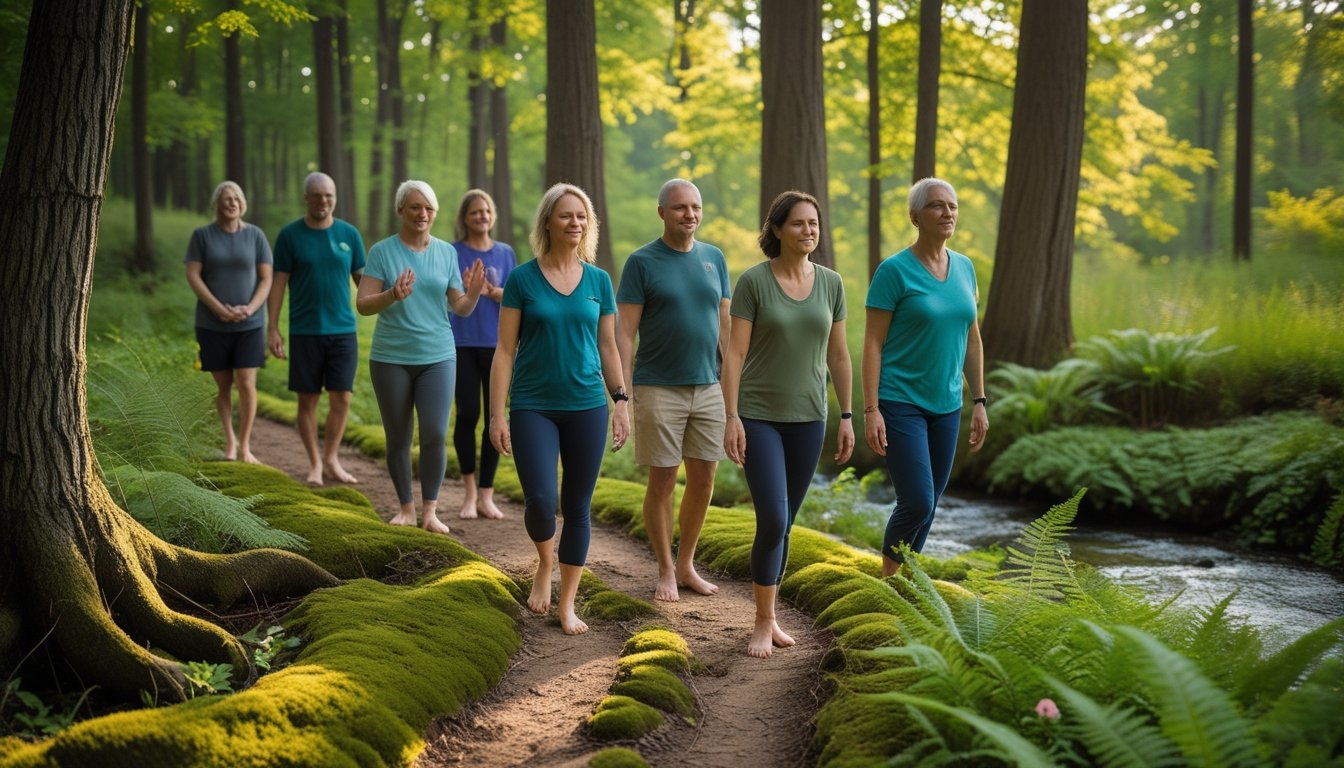Late updated: 08 Aug 2025 09:08
Written by: Ella Thompson
Exploring Eco-Therapy for Emotional Wellbeing: Nature's Healing Powers
Eco-therapy is gaining attention as a remarkable approach to enhancing emotional well-being by reconnecting individuals with nature. The hustle and bustle of urban life can leave us feeling stressed and disoriented. Engaging in activities like hiking, gardening, and forest bathing not only provides stress relief but fosters a deeper connection with our surroundings.

Recent studies and growing interest in ecotherapy highlight its potential for reducing stress, anxiety, and depression. By immersing ourselves in natural settings, we tap into nature's healing power, which supports mental health in ways that traditional therapy may not always address. As we witness the earth’s calming influence, we harness a natural therapeutic technique that appeals to both mental health professionals and nature enthusiasts alike.
As we navigate the journey of understanding ecotherapy, various methods emerge that combine professional guidance with the allure of the outdoors. Key figures in ecotherapy advocate for integrating nature-based therapies into mental health practices, emphasising the synergistic relationship between humans and the environment. This holistic approach offers a refreshing pathway to well-being through the marvel of the natural world.
Key Takeaways
- Eco-therapy enhances emotional well-being by connecting us to nature.
- Natural settings have proven benefits for reducing stress, anxiety, and depression.
- Ecotherapy combines professional guidance with nature for a holistic approach.
Core Principles and Benefits of Eco-Therapy

Eco-therapy, also known as nature therapy, integrates natural settings and activities as a means to improve mental health and emotional well-being. By engaging with the environment, individuals often experience reduced symptoms of stress, anxiety, and depression.
Understanding Eco-Therapy and Its Foundations
Eco-therapy is grounded in the concept that natural surroundings have a profound impact on our mental state. It draws from ecopsychology, which focuses on the relationship between humans and nature. This therapeutic approach harnesses activities like gardening, forest bathing, and wilderness adventures to support psychological health.
The key principles include fostering a direct connection with nature and recognising its healing properties. Practitioners guide participants to immerse themselves in these experiences as a pathway to emotional growth and resilience.
Emotional Wellbeing and Nature Connection
The link between nature and emotional well-being is pivotal in eco-therapy. Being in nature can evoke positive emotions, lower stress levels, and enhance mood. Spending time outdoors helps us disconnect from daily stressors and cultivates mindfulness.
This approach emphasises the value of a deep, emotional bond with the environment, promoting relaxation and mental clarity. Regular interaction with natural elements can lead to a state of tranquillity and can bolster our capacity to handle life's challenges with greater ease.
Evidence-Based Benefits for Mental Health Conditions
Numerous studies have documented the benefits of eco-therapy for various mental health conditions. Spending time in natural settings has been shown to lessen symptoms of anxiety and depression. Activities like walking in green spaces are associated with decreased rumination and increased positive thinking.
Evidence suggests that eco-therapy can improve overall mental health by enhancing self-esteem, fostering social connections, and encouraging physical activity. Its integrative approach offers a complementary strategy to traditional therapeutic methods, thus providing a holistic framework for mental health care.
Key Approaches and Influential Figures in Eco-Therapy
Eco-therapy integrates natural settings into therapeutic practices, focusing on techniques that enhance emotional well-being through nature. It highlights the influential work of individuals, such as Theodore Roszak, who recognised the interconnectedness of human and planetary health.
Structured Activities and Therapeutic Techniques
A wide range of structured activities form the basis of eco-therapy. Techniques like forest bathing, gardening, and eco-walking are central. These activities incorporate intentional nature exposure, providing a way to engage with the environment.
Sessions often include nature walks or yoga in natural settings. Each activity aims to alleviate stress and anxiety, harnessing nature's calming effects. Practical applications are designed to be accessible, making the benefits of nature therapy available to various demographics. Methods can be tailored to individual needs, allowing therapists to focus on specific mental health goals.
Role of Nature in Therapeutic Relationships
In eco-therapy, nature is more than a backdrop; it plays an integral role in the therapeutic process. The natural environment encourages openness and reflection, supporting deeper connections between therapist and client. This synergistic relationship fosters a sense of belonging to a larger ecosystem.
Studies highlight that spending time in nature can boost mental health. It offers psychological benefits such as increased happiness and reduced anxiety. Therapists acknowledge that nature can be a powerful co-facilitator in therapy, breaking down barriers and encouraging candid communication. These experiences enhance the therapeutic alliance, which is a cornerstone of effective therapy.
Pioneering Work of Theodore Roszak
Theodore Roszak is a pivotal figure in the development of eco-therapy. His work in the field of ecopsychology laid the groundwork for understanding the link between human well-being and the natural world. Roszak coined the term "ecopsychology" and advocated for integrating ecological awareness into therapeutic practices.
He argued that environmental problems are deeply connected to mental health issues. Roszak's ideas have influenced many contemporary therapists who incorporate ecological insights into their work. His pioneering efforts continue to shape eco-therapy, inspiring us to explore the balance between our inner and outer worlds. His legacy underscores the importance of considering environmental factors in the quest for mental well-being.
Frequently Asked Questions

In exploring eco-therapy, we aim to address various inquiries related to its practices, certification, and scientific basis. This section also covers examples and potential drawbacks of eco-therapy and its benefits for emotional wellbeing.
What constitutes ecotherapy and how does it contribute to mental health?
Ecotherapy, or nature therapy, encompasses activities connecting individuals with nature to improve mental health. It leverages the restorative effects of the environment, promoting psychological resilience by reducing stress and anxiety levels. This therapy enhances one's overall mood, offering a refreshing break from urban stressors.
Can you provide examples of ecotherapy practices?
Ecotherapy practices are diverse and adaptable. Examples include gardening, nature walks, forest bathing, and mindfulness exercises in natural settings. These activities are designed to facilitate relaxation and foster a deeper connection with the natural world, allowing participants to benefit from the calming influences of nature.
What are the potential drawbacks of utilising ecotherapy?
While eco-therapy offers numerous benefits, there are potential drawbacks. Accessibility can be an issue for those in urban areas or with limited mobility. Additionally, some individuals may not feel comfortable in natural settings or might have allergies or phobias related to being outdoors.
How does one obtain certification in ecotherapy?
Certification in ecotherapy typically involves completing specialised training programmes or courses. These programmes cover environmental psychology, therapeutic practices, and relevant counselling techniques. Prospective practitioners should research accredited courses to ensure they receive comprehensive and recognised certification.
In what ways does ecotherapy offer benefits for emotional wellbeing?
Eco-therapy provides emotional benefits by reducing stress and promoting relaxation. It encourages individuals to disconnect from technology and reconnect with the present moment. Participants often report improved mood, increased feelings of wellbeing, and a greater sense of purpose and vitality after engaging in eco-therapy practices.
Is there a scientific basis to support the efficacy of ecotherapy?
Yes, various studies support the efficacy of ecotherapy. Research indicates that exposure to natural environments can reduce cortisol levels, a marker of stress, and increase serotonin, which stabilises mood. These findings underscore the therapeutic potential of integrating nature into mental health treatments.
